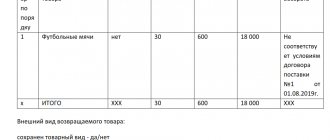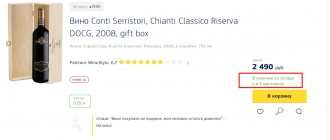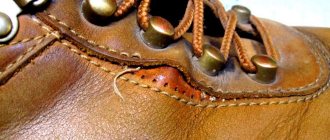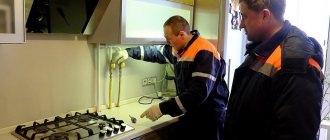When is expertise needed?
Sometimes it is unclear whether a product has a defect or not.
For example, a man bought a set of kitchen furniture in a store, and already at home he discovered a stain on one of the cabinets that caught his eye. According to the seller, this is not a defect, but a shade created by the structure of the wood. The buyer insists that this is a drawback - the furniture does not meet quality standards. Or it happens that the defect is obvious, but a dispute arises as to who is to blame: the defect arose before the goods were transferred to the buyer or the buyer himself damaged the goods. Such disputes especially often arise regarding technology. For example, if a laptop does not work, then it could initially have a manufacturing defect, but the buyer may have flooded it with something.
In both cases, when a dispute arises, an examination is necessary. The procedure for its implementation is prescribed in paragraph 5 of Art. 18 of the Law on Consumer Rights.
Let's sum it up
- The regulation on the type of control is a document establishing the procedure for organizing and conducting inspections by federal, regional and municipal controllers.
- Such a Regulation is being drawn up according to the new rules introduced by the Federal Law “On State Control (Supervision) and Municipal Control in the Russian Federation” dated July 31, 2020 No. 248-FZ.
- From the Regulations on the type of control, a businessman can find out: who is conducting the inspection, the criteria for classifying an object of control into risk categories, a list of preventive measures, the types and frequency of scheduled inspections and other related information.
- The new rules enshrined in Law No. 248-FZ and in the Regulations on the type of control should reduce the number of inspections of companies and individual entrepreneurs, and will also help move away from a formal approach to assessing the effectiveness of controllers.
Unlock access to the private part of Clerk with a Premium subscription. Get hundreds of webinars and online courses, unlimited consultations and other proprietary content for accountants.
Hurry up to subscribe with a 20% discount until October 15, 2021. Read more about “Premium” here.
Who pays for the examination
If a defect is discovered within the warranty period, the seller pays for the examination of the goods. But if it turns out that defects in the product arose due to the fault of the buyer, he will be obliged to compensate the seller for the cost of the examination. And in addition - the costs of storing and transporting goods.
Keep all documents related to the examination. They will be needed if the store collects expenses from the buyer.
If a defect is discovered after the expiration of the warranty period, but within two years from the date of sale of the goods, then the buyer pays for the examination. If the examination shows that the defect arose before the sale of the goods, that is, the defect is manufacturing, the seller will have to compensate the buyer for the cost of the examination - clause 5 of Art. 19 of the Law on Consumer Rights.
If the seller does not satisfy the buyer's demands, he can go to court, and he will collect much more from the store.
A woman bought leather shoes in a store and later discovered that the sole of the right one had become unstuck. The warranty period had expired at the time the defect was discovered.
The buyer applied to the store for a refund for the shoes, but was refused. She conducted an independent examination, which showed that the defect was of a manufacturing nature.
The woman again filed a claim with the store for a refund of the cost of the shoes and reimbursement of the cost of the examination, but did not receive a response, so she went to court.
The court agreed with the conclusions of the examination and recovered from the store:
- the cost of the shoes is 43,950 ₽,
- expenses for the examination 5,000 ₽,
- penalty 25,000 ₽,
- expenses for paying for the services of a representative 5,000 ₽,
- postage costs 1,230 ₽,
- costs for copying services 470 ₽,
- expenses for notary services 2,040 ₽,
- compensation for moral damage 1,000 ₽,
- fine 20,000 ₽;
- state duty 2,568.5 ₽.
So, instead of 48,950 rubles, which the customer asked to reimburse in the claim, the store had to pay 106,258.5 rubles.
Case No. 2-9698/2017 (16)
Who to contact for expertise
To conduct an examination, you can contact either a government organization or a private company that understands the specifics of a particular product.
To assess how well a product meets quality standards or who is to blame for its deficiency, an expert must have knowledge and experience. It is better to contact reputable companies that have already established a business reputation. But if this is not possible, then when contacting the company, check the diplomas and certificates. If it turns out that the expert is not sufficiently qualified, then his conclusions may be challenged by the party against whom the expert opinion will be issued.
If the case comes to court, and the court doubts the conclusions of the examination, it will order another examination.
Product examination must be independent. That is, the expert’s conclusion should not be influenced by either party to the dispute about the quality of the product.
Some stores turn to the same experts and sometimes negotiate with them to draw up an opinion in their favor. But the buyer may not agree with the results. I’ll tell you what follows next.
Regulations on the type of control - what is it?
The regulation on the type of control from 2021 is a document establishing the procedure for organizing and conducting inspections by federal, regional and municipal controllers. Such a Regulation is being drawn up according to the new rules introduced by the Federal Law “On State Control (Supervision) and Municipal Control in the Russian Federation” dated July 31, 2020 No. 248-FZ. The law provides that executive authorities are obliged to adopt such a Regulation for each type of state control (supervision) and municipal control, to provide for the specifics of a particular type of control in the context of its inherent verification activities and actions.
Other innovations of Law No. 248-FZ, including those that came into force on July 1, 2021, include the extension of the moratorium on scheduled inspections for small businesses, the emergence of remote inspections and a new form of control “inspection visit.”
Regulations on types of regional state control (supervision) and regulations on types of municipal control must be approved before 01/01/2022. Until this date, the Federal Law “On the Protection of the Rights of Legal Entities and Individual Entrepreneurs in the Exercise of State Control...” dated December 26, 2008 No. 294 and the regulations adopted in accordance with it are in force.
Control agencies have the right to formulate plans for conducting scheduled inspections only after approval of the relevant Regulations on the type of control.
Thus, how businessmen will be checked and how often they should expect inspectors from a specific control and supervisory authority will become clear from the provisions on a specific type of control.
Can a store limit itself to self-checking quality?
Sometimes sellers believe that they can assess the quality of the product themselves and not contact an independent expert. But the Consumer Rights Act prohibits this. The store can first evaluate the product itself, but if the buyer stands his ground, he will still have to go to an expert.
The man returned the car to the store for warranty repairs due to discovered defects. When braking, the car creaked, knocked when driving over uneven surfaces, and periodically suddenly stalled.
The store conducted a quality check of the car, the results of which did not confirm the stated deficiencies.
The following month, the buyer wrote a second appeal, in which he expressed his disagreement with the car inspection report issued by the store and pointed out the presence of previous deficiencies.
Following a buyer’s complaint, Rospotrebnadzor came to the entrepreneur. The inspection confirmed that the store violated paragraph 5 of Art. 18 of the Law on Consumer Rights - did not conduct an examination of the product at his own expense. The store was fined 10 thousand rubles. according to Art. 14.15 Code of Administrative Offenses of the Russian Federation. The court agreed with the result of the check - and the dispute with the car buyer continued.
Case No. 01-AP-4917/2020.
What do the new rules mean for business?
According to legislators, thanks to the new mechanisms from Law No. 248-FZ, the number of inspections of companies and individual entrepreneurs will be reduced. For example, the new rules provide for such a method of exemption from inspections as recognition of the results of an independent assessment of compliance with requirements - a company or individual entrepreneur can undergo an assessment of compliance with legal requirements in an independent accredited organization, and the regulatory body will accept the results of such an assessment and will not conduct additional checks if the results assessments are successful.
In addition, according to the new rules, a businessman may be exempt from conducting scheduled inspections when concluding an insurance contract for the risks of harm (damage).
You can also get rid of scheduled inspections in another way: enter into an agreement with the control body on safety monitoring and transmit to it the necessary information remotely in an automatic mode using technical means (photography and filming, video recordings, etc.). A businessman who is under such monitoring and who complies with all requirements is exempt from scheduled checks of their compliance.
Now officials will not be able to come up with new types of control measures, since Law No. 248-FZ establishes a closed list of control measures (Article 56 of Law No. 248-FZ). And inspectors will be able to travel directly to the territory of the persons being inspected only in exceptional cases: if they cannot verify the completeness and accuracy of the documents received from the enterprise or assess how well the company’s work meets all the requirements.
The assessment of the effectiveness of the work of regulatory authorities is also changing. The race for the number of inspections and the amount of fines is over. The results of the work of inspectors now do not depend on the number of control activities carried out, violations identified and persons held accountable. The main rule for controllers should be: warn, not punish. Once the new rules come into force, inspectors must pay more attention to preventing violations.
Duration of the examination
The examination of the goods is carried out within the same time frames that are provided to satisfy the buyer’s requirements, which he states when returning the goods. The period is counted from the moment the goods are returned and the goods return certificate is signed.
| Requirement | Examination period | Consumer Rights Law |
| eliminate product defects | As the period for eliminating deficiencies under the contract (no more than 45 days). Immediately, if there is no deadline in the contract. | Art. 20 |
| replace the product | within 20 days | Art. 21 |
| return money, make a discount, compensate for losses or repairs | within 10 days | Art. 22 |
What questions to ask the expert
It is better to prepare the questions that you will need to ask the expert in advance. The more clearly the questions are formulated. the more accurate the expert’s conclusion will be.
The cost of the examination depends on the number of questions - the more questions, the more expensive it is. Sometimes two questions are enough to conduct an examination: whether the product has a significant defect and whose fault it arose. But the questions raised should be enough to resolve the dispute with the buyer
What happens if the buyer does not agree with the results of the examination
If the buyer does not agree with the conclusions of the examination, he can challenge it in court. In this case, the buyer can turn to another expert, bring his opinion to the court, and include the costs of the examination in the amount of the claim. Or the buyer will ask the court to conduct a re-examination.
If the store evades participation in the examination ordered by the court (does not provide the experts with the goods or the necessary documents), then the court may recognize the fact that the goods were sold defective - clause 3 of Art. 79 Code of Civil Procedure of the Russian Federation.
If the court makes a decision in favor of the buyer, all costs of the examination carried out by the buyer or ordered by the court will be recovered from the store.
The article is current as of 08/04/2021







